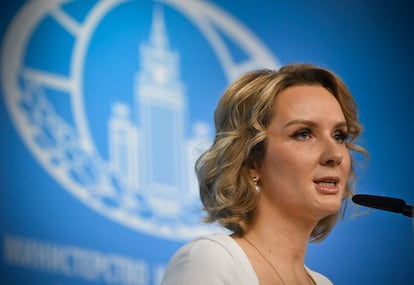Russian charged with war crimes: Ukrainian kids can go home
Maria Lvova-Belova told a U.N. meeting Wednesday that the children were taken for their safety and Moscow is coordinating with international organizations to return them to their families

Russia’s commissioner for children’s rights, who is being sought for war crimes for deporting children from Ukraine, told a U.N. meeting Wednesday that the children were taken for their safety and Moscow is coordinating with international organizations to return them to their families.
Ambassadors from Western countries boycotted the informal U.N. Security Council meeting, sending low-level diplomats instead. Diplomats from the United States, Britain, Albania and Malta walked out when the commissioner, Maria Lvova-Belova, started to address the meeting by video link.
The International Criminal Court last month issued an arrest warrant for her and Russian President Vladimir Putin, accusing them of abducting children from Ukraine.
Russia, which holds the rotating presidency of the Security Council this month, called the meeting to counter what it claims is disinformation about the Ukrainian children.
U.S. Ambassador Linda Thomas-Greenfield told reporters before the session that the United States strongly opposed the briefing and joined the United Kingdom in blocking the United Nations from outside broadcast of the meeting.
Lvova-Belova should not be allowed “to have an international podium to spread disinformation and to try to defend her horrible actions that are taking place in Ukraine,” Thomas-Greenfield said.
An Associated Press investigation, published in October, on Lvova-Belova’s involvement in the abduction of Ukrainian found the open effort to put Ukrainian children up for adoption in Russia was well underway.
The exact number of Ukrainian children taken to Russia has been difficult to determine. A statement posted Wednesday on Twitter by Ukraine’s U.N. ambassador, Sergiy Kyslytsya, said more than 19,500 children had been seized from their families or orphanages and forcibly deported.
Russia’s ambassador, Vassily Nebenzia, said the aim of Wednesday’s meeting was “to unmask the blatant double-standards of the West.”
“Part of this propaganda campaign is the hushing up by the West of the fact that in European countries Ukrainian refugees are having their children taken away,” he said. Videos were then shown of some women claiming their children had been taken in Europe.
Nebenzia also insisted that contrary to Western claims there have been “no forced adoptions.” He said some Ukrainian children are in foster care and claimed there were “no obstacles” for them to maintain contact with their families in Ukraine.
The AP investigation found Russian officials deported Ukrainian children to Russia without their parents’ consent, lied to them that they weren’t wanted by their parents, used them for propaganda, and gave them Russian families and citizenship.
Since Feb. 24, 2022, when Russia invaded Ukraine, Lvova-Belova said Russia has taken in more than 5 million Ukrainians, including 700,000 children — all with parents, relatives or legal guardians except for 2,000 from orphanages in the eastern Donbas.
To date, she said, about 1,300 children have been returned to their orphanages, 400 were sent to Russian orphanages and 358 were placed in foster homes.
Lvova-Belova said there has been no official communication with Ukrainian authorities about the children, but she said her office has met with representatives of UNICEF, Refugees International and the Red Cross and provided all available information about the children. She said Russia was coordinating with the Red Cross on reunification.
Sarah Sheffer, vice president for strategic outreach at Refugees International, denied this. She said Russia has not consulted with her organization about the Ukrainian children.
UNICEF and the International Committee of the Red Cross, which is responsible for reuniting families, did not respond immediately to requests for confirmation of Lvova-Belova’s comments.
Sign up for our weekly newsletter to get more English-language news coverage from EL PAÍS USA Edition
Tu suscripción se está usando en otro dispositivo
¿Quieres añadir otro usuario a tu suscripción?
Si continúas leyendo en este dispositivo, no se podrá leer en el otro.
FlechaTu suscripción se está usando en otro dispositivo y solo puedes acceder a EL PAÍS desde un dispositivo a la vez.
Si quieres compartir tu cuenta, cambia tu suscripción a la modalidad Premium, así podrás añadir otro usuario. Cada uno accederá con su propia cuenta de email, lo que os permitirá personalizar vuestra experiencia en EL PAÍS.
¿Tienes una suscripción de empresa? Accede aquí para contratar más cuentas.
En el caso de no saber quién está usando tu cuenta, te recomendamos cambiar tu contraseña aquí.
Si decides continuar compartiendo tu cuenta, este mensaje se mostrará en tu dispositivo y en el de la otra persona que está usando tu cuenta de forma indefinida, afectando a tu experiencia de lectura. Puedes consultar aquí los términos y condiciones de la suscripción digital.








































